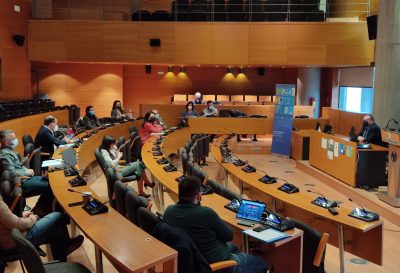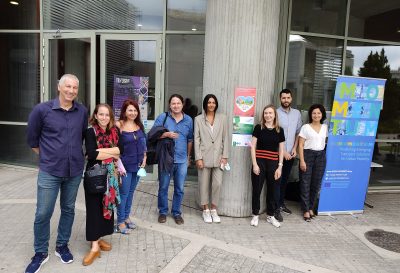
NEWS THESSALONIKI
SUMP objectives, EU-funded projects and a decision-support tool – Thessaloniki is prepared for the future
Thessaloniki held its peer-to-peer workshop in a hybrid format on 23 November 2021.
Thessaloniki, the second-largest city in Greece, is committed to promote sustainable mobility while preserving the resilience of the transport network. The only public transport service currently available in Thessaloniki consists of a dense network of bus lines. A metro is under construction and is expected to be ready by 2020.
The city of Thessaloniki is promoting the sharing economy and new forms of mobility for the improvement of the use of resources. Shared taxi services and bike sharing services are being tested as a MaaS proof of concept. Thessaloniki will also become a large-scale testbed for the implementation and deployment of cooperative mobility services.
Sustainable urban mobility and the implementation of smart and sustainable transport solutions are high in the agenda of the municipality. A Sustainable Urban Mobility Plan (SUMP) with focus on public transport was prepared for the metropolitan area in 2013, and currently all 11 municipalities of the city are developing a local SUMP.
The main objective of Thessaloniki case study is to improve the planning and decision-making process for the introduction of resilient and sustainable mobility schemes, with an emphasis on the adoption of car- and bike-sharing, and MaaS solutions and the management and control of congestion.

Thessaloniki held its peer-to-peer workshop in a hybrid format on 23 November 2021.

The peer-to-peer workshop in Madrid will take place on 23 November.

Thessaloniki shared project updates of MOMENTUM and CliMobCity 2050 in the framework of the annual EUROPEANMOBILITYWEEK.

Our second summer interview focuses on recent achievements in Thessaloniki

In the beginning of July, CERTH-HIT presented the MOMENTUM decision-support tool to local stakeholders in Thessaloniki.

Mr Zervas, major of Thessaloniki, greeted the MOMENTUM consortium, which would have met in Thessaloniki in November 2020.

Researchers in Thessaloniki are taking a closer look at the costs of shared taxi services in comparison to private car use.

We spoke with Georgia Ayfantopoulou from CERTH in Thessaloniki about the challenges of traffic planning during COVID-19 and the emerging mobility solutions of tomorrow.

Thessaloniki is aiming to increase the number of cyclists, enhance the public transport system and finalise the new metro. All efforts are part of Thessalonikis SUMP.
This website uses cookies so that we can provide you with the best user experience possible. Cookie information is stored in your browser and performs functions such as recognising you when you return to our website and helping our team to understand which sections of the website you find most interesting and useful.
Strictly Necessary Cookie should be enabled at all times so that we can save your preferences for cookie settings.
If you disable this cookie, we will not be able to save your preferences. This means that every time you visit this website you will need to enable or disable cookies again.
